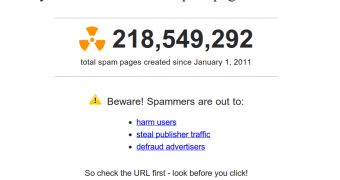Spam or junk web pages designed to drive traffic and filled with ads are a reality most users face each day. For those that know better, the telltale signs are obvious most of the times, but you still get fooled every once in a while, even if it's for a few seconds. And for most people, who are not heavy internet users or may just be coming online, things are far worse.
So if people get fooled, how is a computer going to know any better? Blekko, an upstart search engine, thinks it can't, not without your help anyway.
The search engine has set up the Spam Clock webpage to highlight just how big of an issue spam web pages are. According to the search engine, about one million spam pages are created every hour. Since the start of 2011, it estimates that about 220 million have been pushed online.
Blekko is hardly the first to highlight the issue. In fact, there have been a number of people talking about the quality and relevancy of many search results.
Most people rely on Google to provide them with the results they need and take the bad results as just part of the game. But there does to seem to be an increase in the number of people voicing their concerns over search quality or even ready to predict Google's downfall from it.
The issue is probably more nuanced than this. It is very likely that more spam pages than ever are now created and it is clear that spammers get better and more sophisticated, trying to game Google's ranking algorithm.
But so is Google, the algorithms are constantly tweaked and getting better at weeding out the useless results. Still, spammy pages get in the search pages, sometimes ranking very high.
However, establishing whether there really is an increase in spammy results and a drop in search quality on Google is tricky, people have higher expectations now than they may have had one, two or five years ago, and Google's success has a lot of to do with that.
Blekko's approach is to use human-curated categories, enabling users to get higher quality results, but from a significantly smaller pool of websites. The problem with this is that this relies on the users for help. And as Blekko gets bigger so will the incentives to game this system as well.
For some searches, Blekko's approach is great, but the site can be just as filled with spam as Google for many other. Poor quality pages and search results are clearly a problem, but no search engine stands out as consistently serving better quality results, despite the different approaches.

 14 DAY TRIAL //
14 DAY TRIAL //